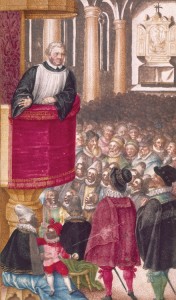Reformation 500
October 31, 2017
Today, October 31, marks the 500th anniversary of the onset of the Reformation, a religious movement that led to Protestantism. According to tradition, German theologian Martin Luther nailed his Ninety-Five Theses (articles for academic debate) on the door of the Wittenberg Castle Church in Saxony (then part of the Holy Roman Empire) on Oct. 31, 1517.

Martin Luther, a German theologian, was a leader of the Reformation, a Christian reform movement of the 1500′s that led to the birth of Protestantism. Credit: British Library, London (HIP/Art Resource)
The theses, protests against certain practices of the Roman Catholic Church, were soon widely circulated. (Protestant comes from the Latin word protestans, which means one who protests.) Luther continued to publicly criticize the church, and in 1520, he published works spelling out his understanding of Christianity and attacking the papacy (authority of the pope) and many traditional practices. He was excommunicated (expelled from the church) in 1521. Luther spent the rest of his life protesting aspects of Catholic authority, guiding the reform movement and creating what became known as Lutheranism or Lutheran Christianity.
The Reformation had a tremendous impact on social, political, and economic life throughout Europe, and its influences are still felt today.


